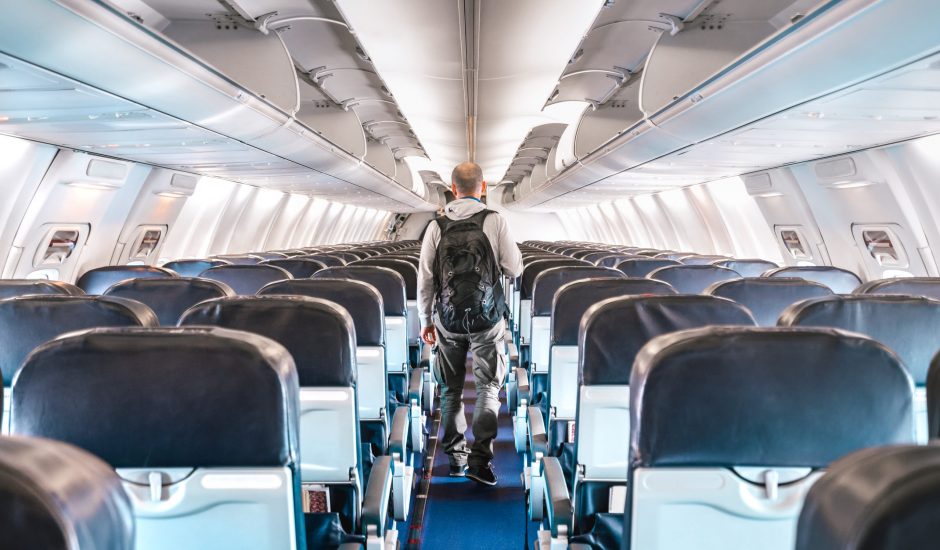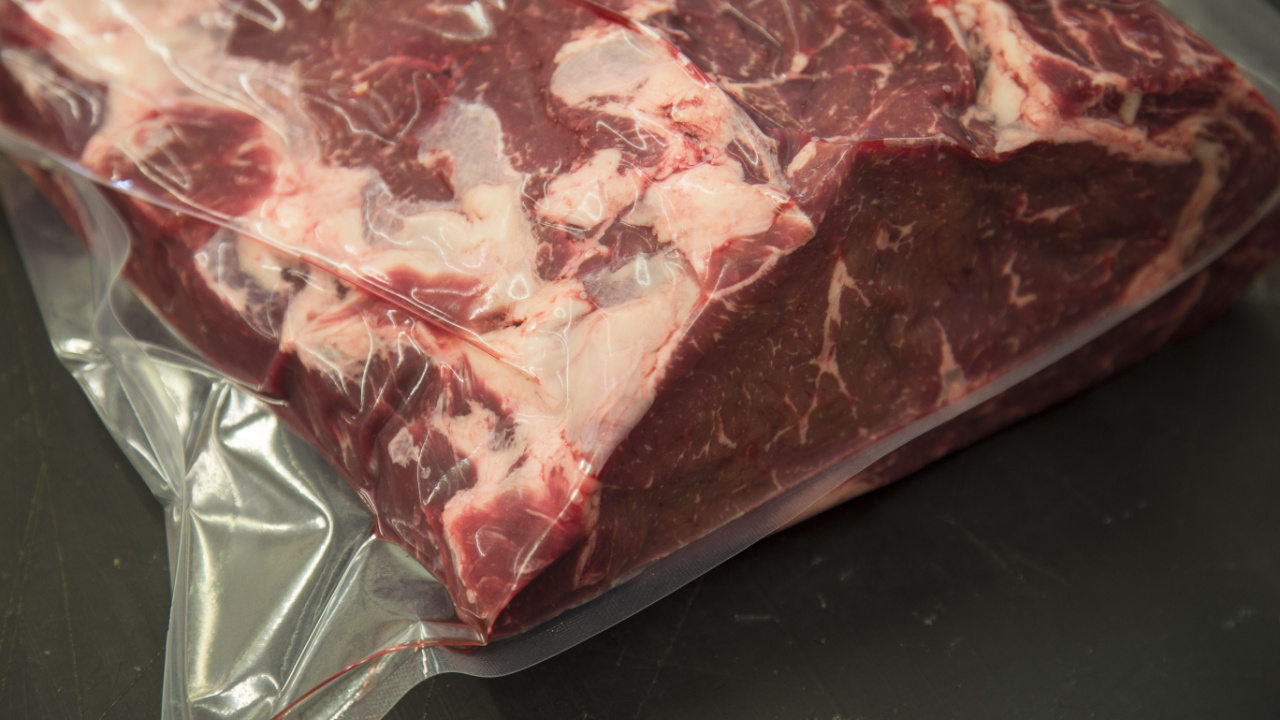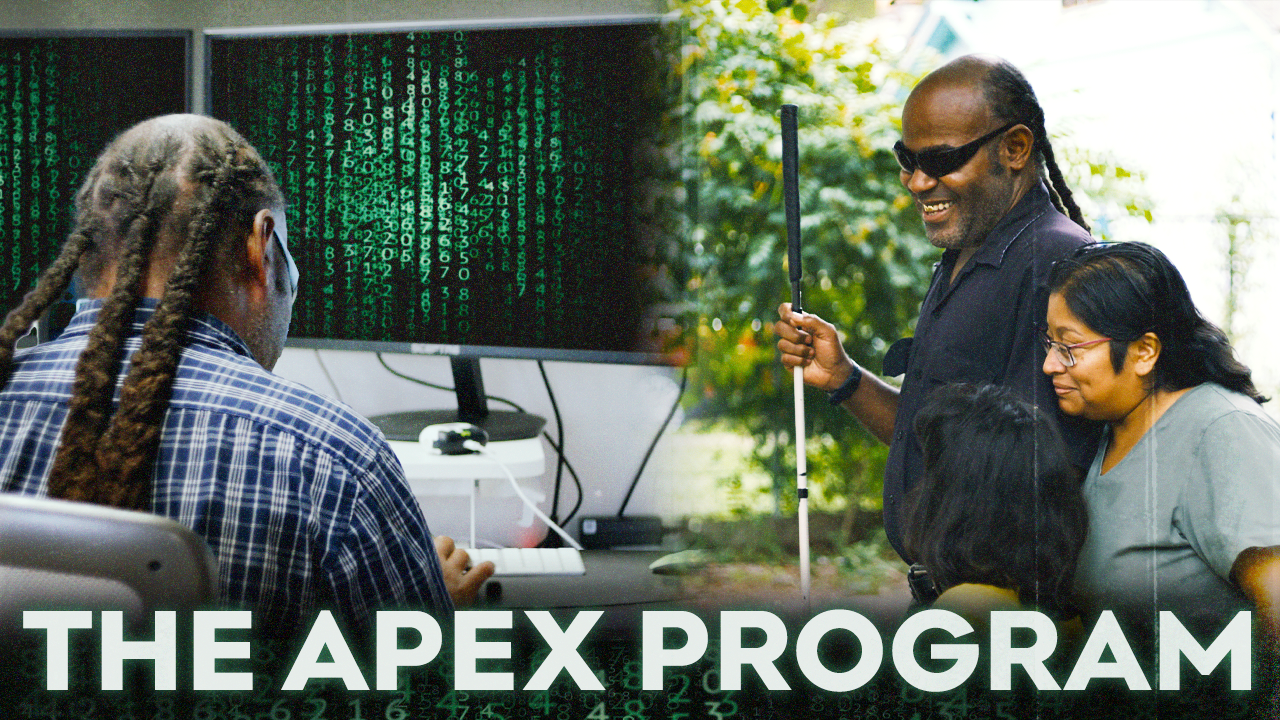
Over 6.6 million Americans applied for state unemployment benefits last week—a signal that job loss is accelerating in the midst of the pandemic.
Over the past three weeks, 16.8 million claims have been filed, and the number is expected to be high again next week as the COVID-19 health and economic crisis continues to unfold.
Among those hardest-hit are workers in the hospitality industry. In March, according to the Bureau of Labor Statistics (BLS), employment in that sector fell by 459,000, with 417,000 of those jobs in food services and drinking places.
Restaurants Seen as “Essential”
Before the crisis, the restaurant and bar industry employed more than 15 million people across the country. Today, they are considered an essential industry as more an more states require its residence to stay at home. Restaurants are considered an essential industry, Since the pandemic started to spread, but in most states, they are only allowed to offer takeout and delivery orders.
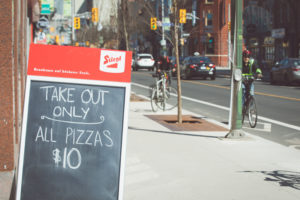
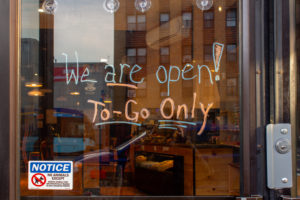
“Restaurants and employees have been community lifelines during the COVID-19 crisis, all while dealing with a catastrophic cash flow crunch, massive layoffs, and in too many cases, total shutdowns,” says Sean Kennedy, Executive Vice President of Public Affairs for the National Restaurant Association.
In just a month’s time, the industry has lost more than $25 billion in revenue, according to the restaurant group. Approximately 30,000 restaurants across the country have permanently closed and more than 110,000 are expected to shut down over the next month.
Public Health Concerns
For owners such as Ken Kaufman, the challenge to keep his restaurants—Rush Street and City Tavern, both in Culver City, California—afloat was further complicated by public health concerns. Regular customers vowed to continue ordering under the new take-out/delivery restrictions, but he ultimately chose to close both of his restaurants for now, putting more than 100 employees out of work.
“Beyond the concern about their economics is the concern about having to work together in an environment that may be a danger. I had no desire to put my staff in harm’s way either,” Kaufman says. “So, the balance between putting them in harm’s way and trying to do take out or delivery or trying to do some kind of work for the restaurant was in conflict with each other.”
Economically Vulnerable Workers
“Most people don’t have a lot of money in the bank to withstand this kind of cessation of paychecks. And I worry about them every single day. That’s my immediate worry,” he says.
Some of his employees worked at his restaurants while pursuing careers in other fields, including nursing. But, Kaufman says, he worries most about the others who are at the other end of the spectrum when it comes to work that doesn’t require in-demand skills, such as entry-level dishwashers.
“Culver City has already created a recovery committee to talk about what are we going to do when we have to recover. And I’m very much a part of that and talking to the council people. My way of dealing with this is to try to find solutions because on a day to day basis, I love Culver City and I love our restaurants and I love our business and I want to succeed for another 20 years.”
For long-term success after this pandemic, he says it’s about more than just economic recovery. “The service economy has grown so dramatically in the last three years. It’s important that we get supported,” he says. “But the truth is, this is a public health crisis and that’s where we should devote our energies. As I said to everybody, stay safe, stay healthy, and we could solve the problems after that.”
Aiding the Restaurant Community
During the crisis, some restaurants are preparing meals for hospital workers and communities in need. The industry is also banding together to help each other.
The Dining Bond Initiative was created by the professional organization Support Restaurants. Similar to a savings bond, a Dining Bond can be purchased now to provide funding to a restaurant.
The Restaurant Workers’ Community Foundation created the COVID-19 Emergency Relief Fund to provide zero-interest loans to assist restaurants when they reopen and individual workers suffering from financial hardship.
Additionally, the Restaurant Employee Relief Fund was created to help industry employees experiencing extraordinary hardship as a result of the pandemic.
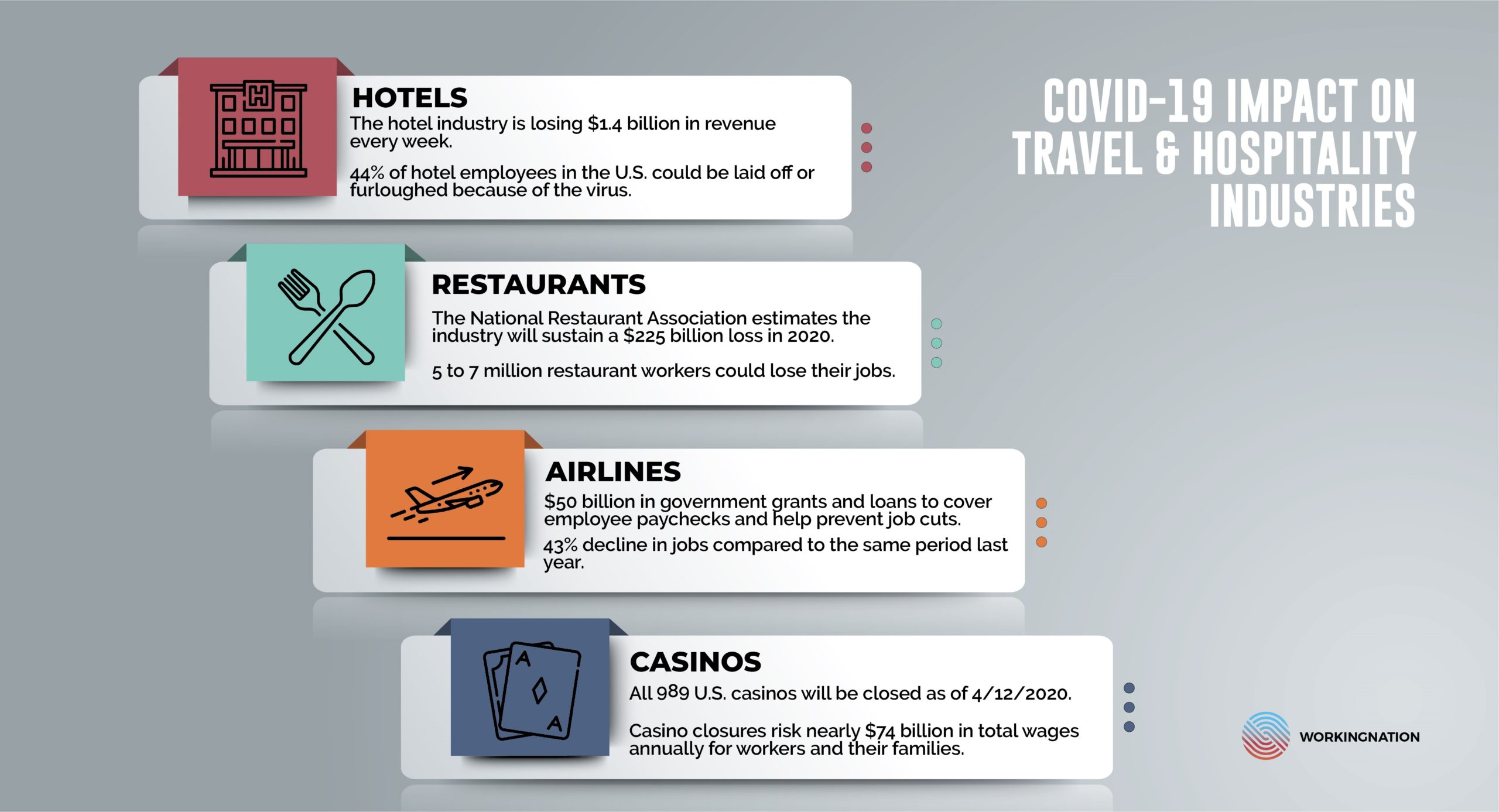
The Impact on the Travel Industry
The restaurant industry is not alone. The U.S. travel industry could experience a 75 percent plummet in revenue over the next two months, and a 31 percent decline over the year, according to Oxford Economics. Millions of jobs are impacted—pilots, captains, conductors, baggage handlers, ticket agents, flight attendants, rental car employees, mechanics, taxi drivers, and airport retail workers.
“This unprecedented public health crisis has quickly become a catastrophic economic crisis as well,” said Roger Dow, President and CEO of the U.S. Travel Association. “The losses for the travel industry alone are projected to double the unemployment rate over the next two months and plunge the country into recession.”
The hit to the airline industry alone is estimated to be more than $110 billion.
Hotel Chains Furlough Workers While Execs Take Pay Cuts

The hotel industry estimates a loss of more than $5 billion since mid-February, with the potential to lose more than $500 million a day in room revenue based on predicted occupancy rates. Almost four million jobs will be lost because of the pandemic, according to the American Hotel & Lodging Association (AHLA).
“The impact to our industry is already more severe than anything we’ve seen before, including September 11 and the great recession of 2008 combined,” stated Chip Rogers, President and CEO of the AHLA. Rogers says the COVID-19 crisis represents the single largest decline in travel in modern times.
Major hotel chains have already turned to furloughs to try and stay afloat. Marriott, Hilton, and Hyatt have laid off the majority of its employees while executives take pay cuts. Hilton is trying to help employees transition to short-term paid jobs by partnering with companies such as Amazon, CVS, Lidl, and Albertsons.
Some hotel workers—like those in housekeeping—may be able to transition to similar roles, which are now spiking in demand because of the pandemic. ZipRecruiter says job postings for cleaners are up 75 percent over the same time period last year.
Upskilling for the Post-COVID Economy
While waiting to be rehired or moved to a new job, hospitality workers can upskill with free trainings, like those provided through the American Hotel & Lodging Educational Institute for supervisory skills, hospitality management and certified hotel administrator.
The Florida Atlantic University’s (FAU) Hospitality and Tourism Management program is offering five free online sessions this month covering hospitality law, career competencies, marketing and revenue management, finance fundamentals, and service excellence for a certificate.
“Hospitality will always rebound, but this is the first global crisis where every hospitality segment was affected at the same time,” said Peter Ricci, Ed.D., Director of the FAU program. “This is a tool to keep people positively engaged while they are not at work so they can be better prepared to hit the ground running when things do ramp back up.”
Casinos and Cruise Lines
The Las Vegas Strip is empty, shuttered since mid-March, throwing thousands of casino workers and entertainers out of work. Casinos such as MGM, and resident entertainer Bruno Mars, donated millions to an emergency employee fund. With operations at a standstill, most workers are furloughed, if not laid off.

Some union workers will be able to return to their jobs once the casinos reopen; for non-union workers, they may have to reapply for their jobs. By April 12, all 989 casinos in the country will be closed, including tribal gaming properties which employ 700,000 people.
Some cruise line employees are still working with ships in dock and passengers waiting to disembark. The cruise industry accounts for 421,000 U.S. jobs, but many cruise lines are incorporated in other countries. That means those companies are not eligible for part of the $2 trillion bailout under the federal CARES Act.

